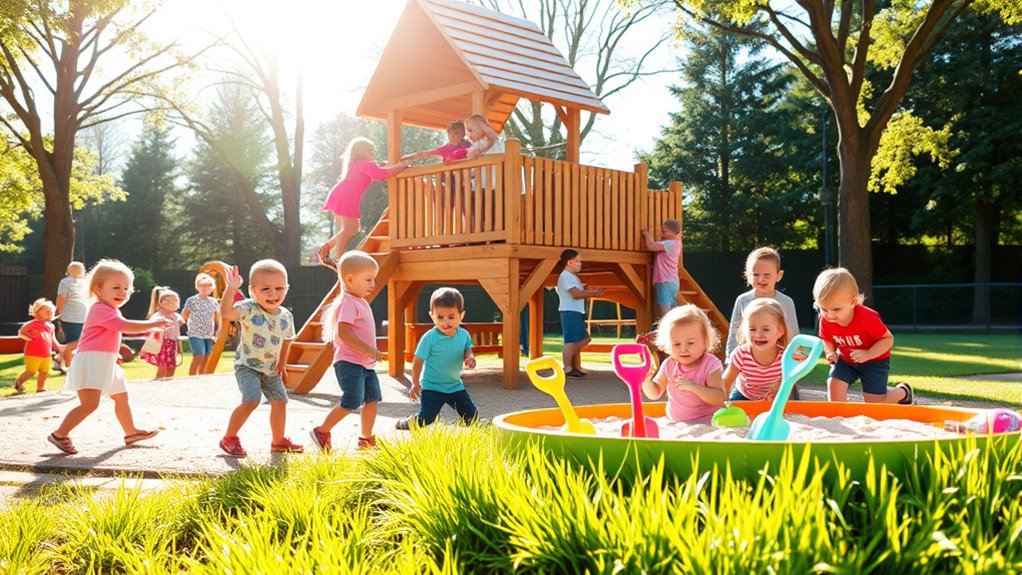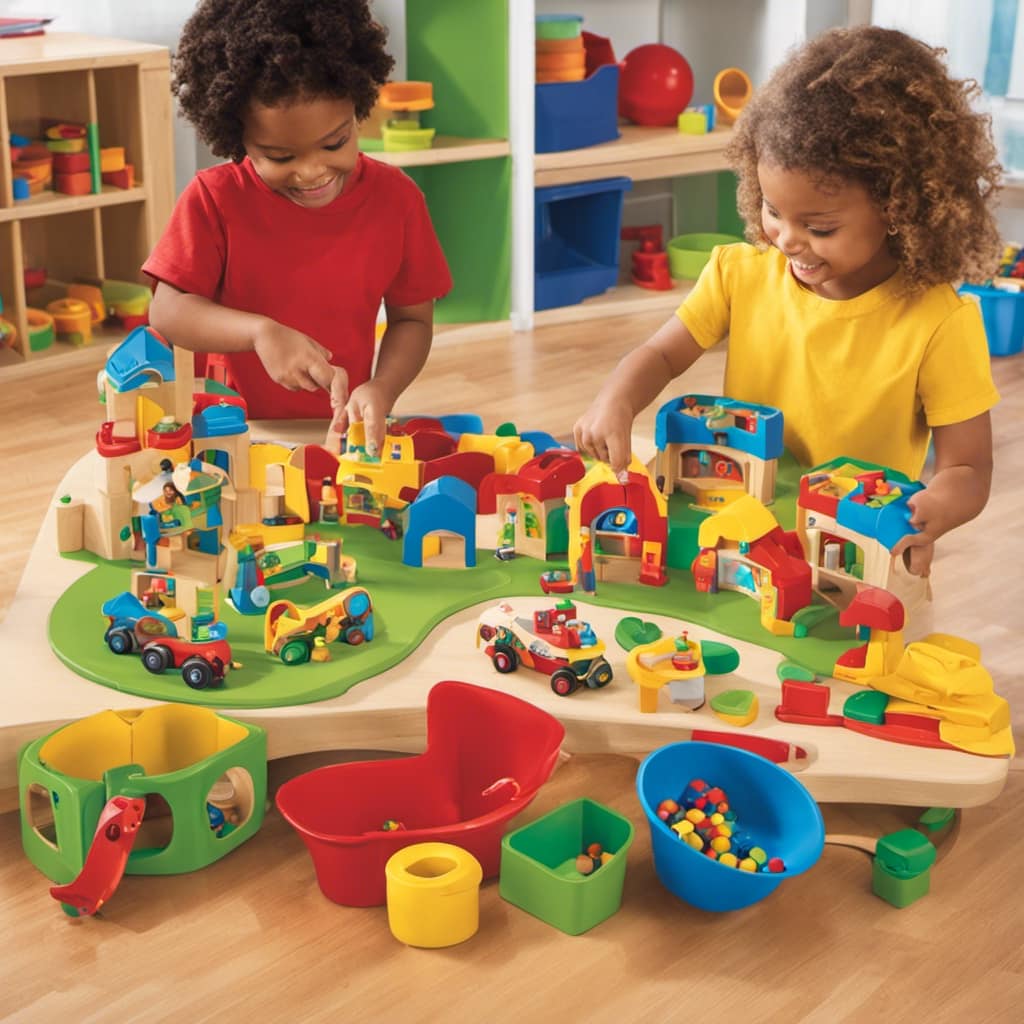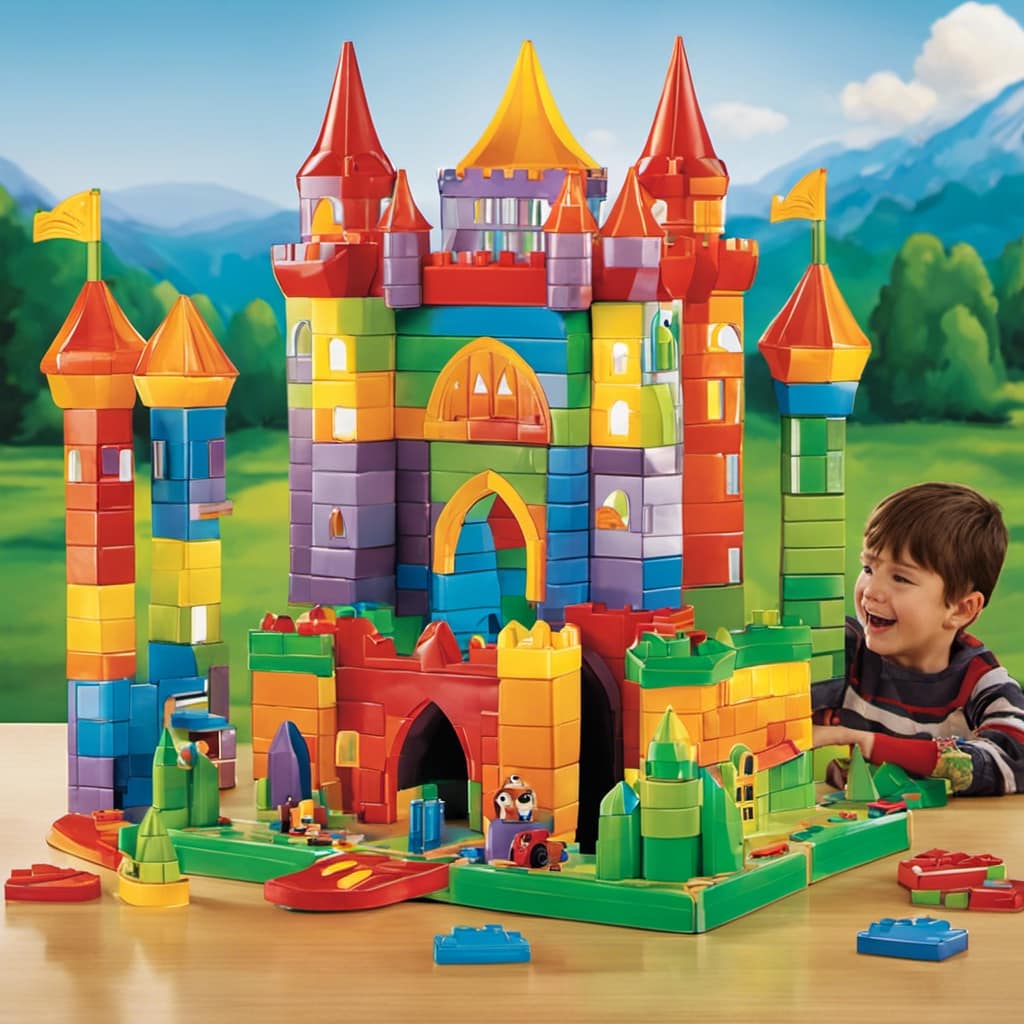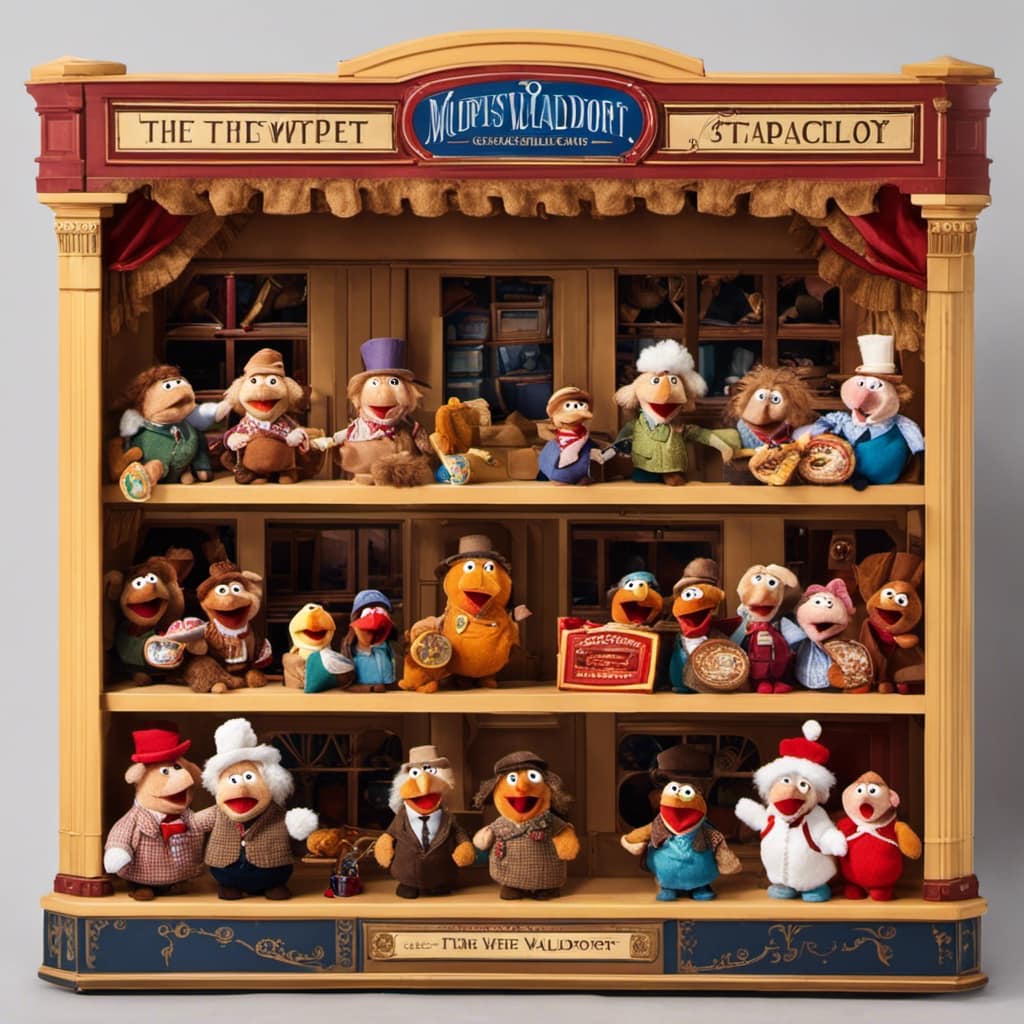To make outdoor play for preschoolers fun and safe, choose toys like magnifying glasses, bug catchers, and buckets for exploring nature. Incorporate activities such as scavenger hunts, climbing, and jumping to develop their gross motor skills and curiosity. Always supervise closely, guarantee the play area is hazard-free, and teach safety rules. Want more ideas on creating exciting outdoor adventures? Keep exploring for tips that turn outdoor time into a memorable learning experience.
Key Takeaways
- Incorporate nature exploration tools like magnifying glasses and bug catchers to encourage curiosity and detailed observation.
- Use age-appropriate outdoor toys such as swings, slides, and climbing structures to promote gross motor skills.
- Plan scavenger hunts with natural items like leaves and rocks to combine play with learning and environmental awareness.
- Establish regular outdoor routines that focus on safe exploration, discovery, and fostering independence in preschoolers.
- Supervise closely and teach safety practices while allowing children to explore and interact with their environment confidently.

Outdoor play is essential for preschoolers because it helps them develop physical skills, foster creativity, and build social connections. When you encourage your child to explore nature, you’re giving them opportunities to discover the world around them firsthand. Nature exploration can include activities like observing insects, collecting leaves, or climbing trees, all of which boost their curiosity and understanding of their environment. However, safety precautions are crucial during these adventures. Before heading outdoors, verify the play area is free from hazards like sharp objects, toxic plants, or uneven ground that could cause falls. Teach your child to stay within designated safe zones and supervise closely, especially when exploring unfamiliar areas. Using appropriate clothing, like sturdy shoes and hats, can also protect them from scrapes, insect bites, and sun exposure.
Ensure outdoor safety by checking for hazards and supervising your child’s nature explorations.
Integrating nature exploration into outdoor play not only enhances sensory experiences but also encourages problem-solving and imaginative thinking. For example, you might set up a mini scavenger hunt for leaves, rocks, or flowers, prompting your preschooler to observe and categorize what they find. This kind of activity promotes attention to detail and scientific curiosity. As they move through natural settings, they develop gross motor skills—climbing, jumping, running—while maneuvering uneven terrain. These physical activities strengthen muscles and improve coordination. Additionally, incorporating outdoor toys and tools can make exploration safer and more engaging for your child.
To make outdoor exploration even more engaging, provide tools like magnifying glasses, bug catchers, or small buckets for collecting treasures. These tools motivate your child to interact more deeply with nature, turning a simple walk into an educational adventure. Remember, safety precautions should always be in place; for instance, check for ticks after outdoor activities, apply sunscreen, and remind your child not to touch unfamiliar plants or animals. Teaching them respect for nature also instills responsibility and awareness of environmental conservation.
Creating a routine that emphasizes safe nature exploration ensures your preschooler benefits fully from outdoor play. It’s an opportunity for them to learn independence, develop confidence, and appreciate the outdoors. Keep the focus on fun and discovery, rather than just completion of an activity. As you supervise, guide, and explore together, you’re helping your child build a love for outdoor activity that can last a lifetime. Ultimately, outdoor play that includes safe nature exploration enriches your child’s physical, cognitive, and emotional development, making it an essential part of their early childhood experiences.
Frequently Asked Questions
How Can Outdoor Play Support Preschoolers’ Social Development?
Outdoor play greatly supports your preschooler’s social development by encouraging peer interaction and boosting cooperation skills. As they play together, they learn to share, take turns, and communicate effectively. These activities help your child build friendships, understand social cues, and navigate group dynamics. By engaging in outdoor play, your preschooler develops essential social skills that lay the foundation for healthy relationships and emotional growth.
What Safety Precautions Should Parents Take During Outdoor Activities?
During outdoor activities, you should prioritize parent supervision to keep your preschooler safe and be alert to hazard awareness around the play area. Confirm the environment is free of dangerous objects, and check equipment for stability. Keep an eye on your child at all times, and set clear boundaries. By staying vigilant and proactive, you help prevent accidents and create a safe, enjoyable outdoor experience for your preschooler.
Are There Eco-Friendly Outdoor Toys Suitable for Preschoolers?
You’ll find plenty of eco-friendly outdoor toys for preschoolers made from recycled materials and natural textures. These toys are safe, sustainable, and encourage imaginative play. Look for options like wooden blocks, recycled plastic ride-ons, or natural fiber balls. By choosing these, you support environmental health while providing stimulating, durable toys that your child will enjoy. Eco-friendly outdoor toys are an excellent way to promote eco-conscious habits early on.
How Can Indoor Spaces Be Adapted for Outdoor-Like Play?
Imagine transforming your indoor space into a vibrant outdoor wonderland. You can craft indoor obstacle courses with cushions, tunnels, and climbing zones that mimic outdoor adventures, sparking your child’s imagination. Add a touch of nature by incorporating small backyard gardening projects, where little hands plant seeds and watch them sprout. These adaptations turn your home into a dynamic playground, fostering physical activity and curiosity without stepping outside.
What Are the Benefits of Unstructured Outdoor Play Versus Structured Activities?
You’ll find that unstructured outdoor play offers many benefits compared to structured activities. Free play encourages your preschooler’s creativity development and allows them to explore their interests at their own pace. It promotes problem-solving skills, independence, and social interaction. By letting kids lead their play, you give them space to imagine, invent, and learn naturally, fostering a love for outdoor activities that can last a lifetime.
Conclusion
Don’t let worries about safety hold you back—outdoor play boosts your preschooler’s growth and happiness. With simple, age-appropriate toys and activities, you can create a fun, secure environment where your child explores and learns. Remember, supervised outdoor fun helps build confidence, coordination, and social skills. So, get outside today! Your little one will thank you for the adventures and opportunities to grow, all while having a fantastic time in the fresh air.










